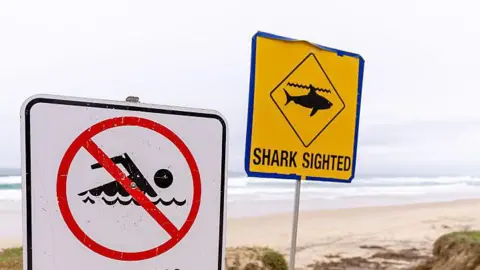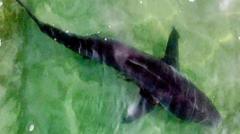Mauricio Hoyos still remembers the pressure that the jaws of a female Galapagos shark, over 3m (10ft) in length, exerted on his skull. The animal had lunged at him with astonishing speed, giving him barely enough time to duck his head in a last ditch effort to protect his jugular vein. When it closed its jaw, I felt the pressure of the bite, and then, after what I think was a second, it opened it again and it let me go, Hoyos told BBC Mundo from his home in Baja California, Mexico, a little over month after surviving the incident.
Hoyos, a marine biologist with over 30 years of experience studying sharks in their natural habitat, was on a research trip in Costa Rica when he was attacked by the shark in September. Less than two months on, and still bearing the scars from the attack on his face, he describes his recovery as incredible - and says he even hopes to encounter his assailant again.
For Hoyos, what happened to him that day in the waters off Cocos Island is the result of normal animal behaviour when confronted with a perceived threat. He believes the bite did not stem from aggression but rather a mistake in the shark's judgment.
After reaching the surface, a young man pulled him aboard the boat, and when the captain saw his condition, he called the park ranger station to report the incident. Hoyos explained that he didn't feel the pain of his injuries until much later, attributing this to adrenaline. His recovery was remarkably swift; the doctors noted how his wounds healed without infection.
Hoyos expresses a deep respect for sharks and their role in ocean ecosystems, saying, This is the proof that this female spared my life; I can't put it any other way. He is now planning to return to diving and hopes to see that same shark again.
Hoyos, a marine biologist with over 30 years of experience studying sharks in their natural habitat, was on a research trip in Costa Rica when he was attacked by the shark in September. Less than two months on, and still bearing the scars from the attack on his face, he describes his recovery as incredible - and says he even hopes to encounter his assailant again.
For Hoyos, what happened to him that day in the waters off Cocos Island is the result of normal animal behaviour when confronted with a perceived threat. He believes the bite did not stem from aggression but rather a mistake in the shark's judgment.
After reaching the surface, a young man pulled him aboard the boat, and when the captain saw his condition, he called the park ranger station to report the incident. Hoyos explained that he didn't feel the pain of his injuries until much later, attributing this to adrenaline. His recovery was remarkably swift; the doctors noted how his wounds healed without infection.
Hoyos expresses a deep respect for sharks and their role in ocean ecosystems, saying, This is the proof that this female spared my life; I can't put it any other way. He is now planning to return to diving and hopes to see that same shark again.

















